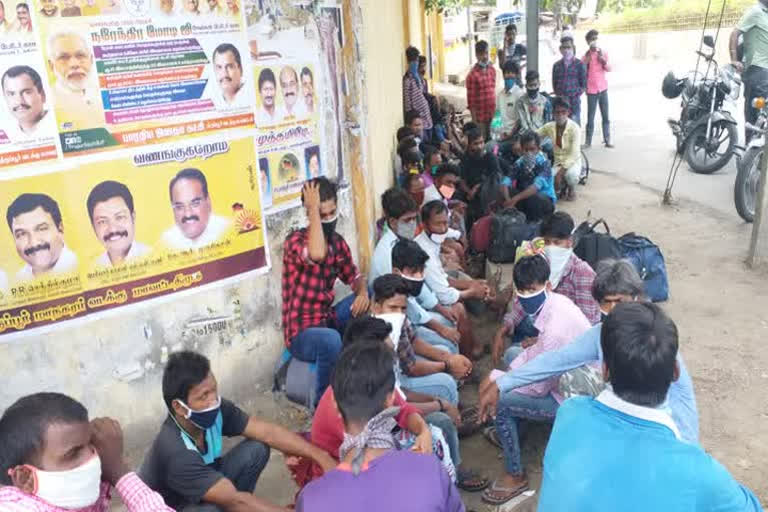Tiruppur (Tamil Nadu): Tirupur, nicknamed the dollar city and the hosiery capital for its phenomenal export potential, no longer seems to be the land of opportunities, as migrants from North India are left stranded owing to the COVID-19 situation.
Thousands of migrant workers from North India, who comprise a large chunk of Tiruppur’s workforce, are now taking shelter under the open skies around the city’s railway station, as they wait to board 'Shramik Special' trains back home.
Hopeful of getting themselves and their families on a shramik special train back home, many of the migrants have vacated their rented homes and are now on the streets.
Among the cities in Tamil Nadu which have a large concentration of migrant labourers, Tiruppur occupies an important place. That the migrant workforce is the backbone of the labour-intensive export-oriented garment industry may not be an exaggeration. A survey by the Tirupur district administration during the initial days of the lockdown revealed that there were over 1.50 lakh migrant workers staying in rented houses. Their numbers could be much more.
With all industrial activity coming to a standstill, they have been rendered jobless. Even though the district administration and philanthropists, as well as volunteers, have provided succour to them to tide over the crisis, their situation remained pathetic.
The announcement about Shramik trains following the easing of the lockdown came as a silver lining for them. Many registered for their travel as advised by the government and that number alone adds up to a whopping 80,000. Besides those who have registered, others too started heading to the railway station.
Read: Op Samudra Setu: INS Shardul to bring back stranded Indians from Iran
However, for the past one week they remain stranded as there are not enough trains to ferry them.
So far, as many as 45,000 migrant workers have left for their home states through the 32 trains. They have been sent to Odisha, Jharkhand, and Uttar Pradesh among other North Indian states. Apart from them, another 15,000 have boarded buses either arranged by them or by volunteers and NGOs, say sources in the district administration. Yet, there are thousands waiting to somehow get a train to proceed to their native places.
Some of them said that they have been waiting for more than a month after registering with the government. Some others have been told by their employers and others to get a train ticket at the railway station. Having come here, they have made the streets their homes and face harassment at the hands of the police at night.
According to the migrant workers, those who have registered with the government for their journey are being provided food until they board a train. But their numbers are so high, making the travel arrangements a mammoth task. Further, the Centre has to ply the requisite number of trains and their native states have to give the green signal to receive them.
As a result, it might take some more time to send all of them to their respective home states, say officials with the district administration.
Though apparently reasonable, the above official explanation might not be able to pacify or alleviate the sufferings of many, including pregnant women and young children who have nowhere else to go.
Read: Ghaziabad: Auto gear factory shuts its manufacturing unit, workers protest



